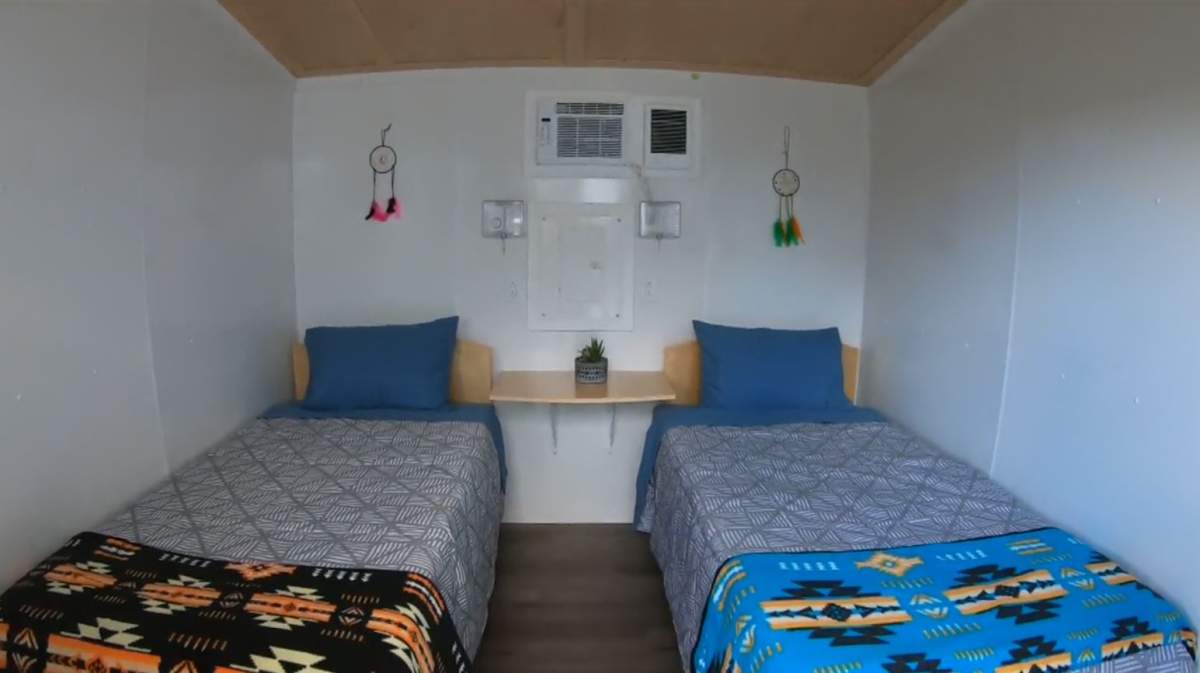It’s taken nearly two years, but a long-awaited tiny home village aimed at alleviating Vancouver’s homelessness crisis is set to welcome new residents.

The project at 875 Terminal Ave. includes 10 tiny homes and the capacity to house up to 18 people. Each 100 square-foot unit is equipped with heat, air conditioning, power and a lock on the door.
They will be able to house couples or adult family members in a caregiver relationship who wouldn’t typically be able to stay together in a shelter.
“These units are so important,” said Kevin Eaton, executive director of supportive housing at the Lu’Ma Native Housing Society, which will operate the homes.
Residents will also be able to access all of the support services offered at Lu’Ma’s nearby traditional homeless shelter.

Vancouver city council approved the pilot project in February 2022, allocating $1.5 million to the two-year initiative.

Get breaking National news
It was initially slated to open last fall, but was delayed to spring of this year, and then delayed again.
City of Vancouver homelessness services director Bruk Melles said the rollout of the tiny homes was complicated by the fact they were a new design for the city. While they were pre-fabricated, they required modifications for the site, as well as the installation of life-safety components to be legal.
“We’re working in a context where, as much as possible, it was a mobile, manufactured, pre-fab structure. However, as the project came along, we realized there were some features that needed to happen on-site, ensuring that there are safety features in place, ensuring that foundations were built,” she explained.
“This is a very atypical building structure, so any time whether it’s the city or provincial government that’s working through that type of atypical structure within an existing process — there will be challenges.”

Melles acknowledged the project had gone “a little over budget” but couldn’t immediately say by how much. She said there were a variety of “learnings” to consider from the design and build phases, which will be considered when the pilot project is reviewed.
Vancouver Coun. Pete Fry, who voted for the pilot project in 2022, said he was pleased to see the facility opening, but that it was long overdue. Challenges with getting it up and running were a good example of why the city can’t go it alone on housing, he added.
“It’s been a complicated undertaking. And I think it does point to one of the challenges with trying to deliver this on a local government scale when it really is the kind of thing we would like to see the provincial government step in with,” he said.
“It can’t all be on the City of Vancouver or any local government in British Columbia.”
While the tiny home village represents a made-in-Vancouver attempt, Fry said there are other companies producing prefabricated modular huts that the province could turn to on a larger scale to rapidly produce shelter.
It’s a need that remains pressing, he said, as the region’s unhoused population continues to grow and long waits get longer to get people into permanent housing.
“We need rapid solutions for folks who are experiencing it right now so we can get people stable, get them a locking door, get them a roof over their head and the ability to find that security and move on with their lives,” he said.
Meanwhile, Lu’Ma is preparing to welcome the residents of the tiny home village as early as next week.
Sign up to receive newsletters and breaking news email alerts.









Comments
Want to discuss? Please read our Commenting Policy first.